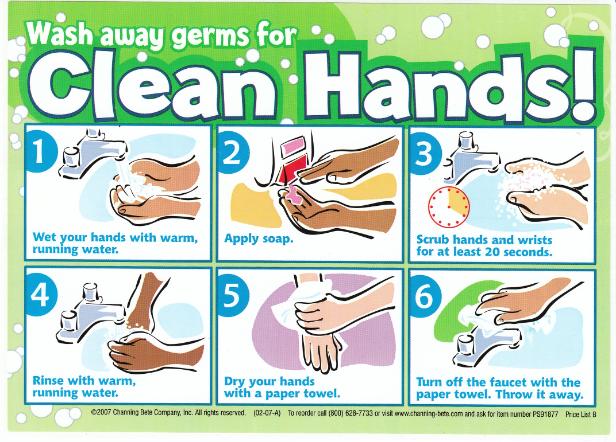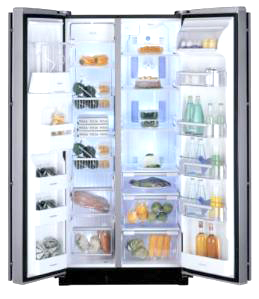Food Retail and Mobile Unit Resource Links (click)
Hand Washing 101

Okay, so you’ve heard it before. But for food handlers, the point can not be made often enough: hand washing is the single-most important means of preventing the spread of infection. Simple acts like blowing your nose, using the toilet or scratching your face can contaminate hands with potentially deadly bacteria. Those germs can be spread to food if you fail to wash your hands frequently and thoroughly.
When must hands be washed?
- Before preparing foods or putting on gloves
- After touching human body parts (other than clean arms or hands)
- After using the toilet
- After caring for or touching animals
- After coughing, sneezing, using a tissue or handkerchief, using tobacco, eating or drinking
- After engaging in any activities that might contaminate the hands, like taking out garbage, handling soiled utensils or equipment, handling cleaning chemicals
- During food preparation when switching from working with raw to ready-to-eat foods
Safe Food Temperatures
| 165°F | Poultry, all stuffings, stuffed foods containing meat, fish and poultry, field dressed game, reheated foods. |
| 155°F | Pork, Ground Meats and Ground Fish, Shell Eggs (Cooked Ahead), Game |
| 145°F | Whole Cut Meats and Fish, Short Order Shell Eggs |
| 140°F | Hot Held Potentially Hazardous Foods |
| 41°F | Cold Held Potentially Hazardous Foods |
| 0°F | Frozen Foods (Frozen hard, Ideally 0°F) |
Keeping Food Safe During a Power Outage

When the power goes off, it is important to know how to keep frozen or refrigerated food safe to eat. A refrigerator can normally stay safely cold for four to six hours, depending on how warm your kitchen is. A fully stocked freezer will keep food frozen for two days if the door remains closed. A half-full freezer can keep foods frozen about one day.
If the power is out longer than four to six hours, refrigerated food can spoil. To keep food safe to eat, add a block of ice to the refrigerator. As the ice melts, the water may saturate food packages. Be sure to keep packages out of the water as it drains. High-protein foods, such as dairy products, meat, fish, and poultry should be consumed as soon as possible if power is not restored immediately. These foods cannot be stored safely at room temperature. Fruits and vegetables can be kept safely at room temperature until there are obvious signs of spoilage; like mold, slime or wilt.
To keep frozen foods safe when the electricity is off for more than one to two days, keep the freezer door closed. If friends or family have electricity, divide frozen foods among their freezers, or seek freezer space at a store, church, school, or commercial meat locker. Buying a block of ice or dry ice cold also save frozen foods from spoiling. Twenty-five pounds of dry ice will keep a 10-cubit-foot freezer below freezing for three
to four days. However, dry ice freezes everything it touches and should not be touched with bare hands. If food is still “cold-to-the-touch,” it may be cooked and eaten immediately, or refrozen.
If you have any questions, please contact the Marion County Health Department at:
118 Cross Creek Boulevard
Salem, Illinois 62881
Phone: (618) 548-3878
Fax: (618) 548-3866
Email the Supervising Sanitarian at: ccain@marionco.illinois.gov
